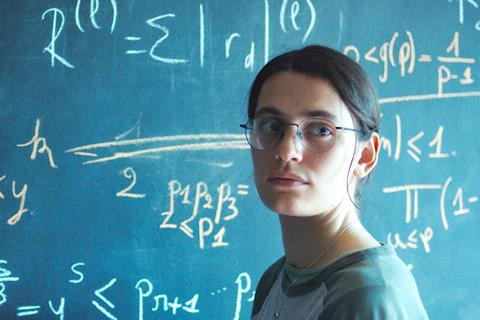Ella Rumpf plays a maths PhD student who finds life - and love - outside her textbook existence

Dir: Anna Novion. France/Switzerland. 2023. 112mins
The complexities of love and mathematics are reduced to a disappointingly simple sort of equation in Marguerite’s Theorem, the largely lukewarm third theatrical feature from French director Anna Novion, whose 2008 debut Grown Ups premiered in Critics Week. Arriving more than a decade after her second film Rendezvous In Kiruna (2012) – Novion having directed episodes of French TV drama The Bureau in the interim – it’s essentially an old-fashioned romantic tale built around a sympathetic performance by Ella Rumpf of Raw and recent Tokyo Vice renown.
Seldom off-screen, Rumpf provides the bulk of the film’s charm and appeal
Co-producers for this Franco-Swiss enterprise include several TV channels and, despite the widescreen format, the result does seem more suitable for small-screen play than theatrical. Further festivals may bite in the wake of its Cannes premiere, however.
Rumpf plays Marguerite Hoffman, a 25-year-old PhD candidate at France’s prestigious Ecole Normale Superieur — an institute which has yielded 11 winners of the Nobel-equivalent Fields Medal. Fans of Gus Van Sant’s Good Will Hunting will recall this was the honour won by Stellan Skarsgard’s character in the 1997 Oscar-winner, which remains perhaps the most winning way in which cinema has tackled the abstruse realm of high-level mathematics. Two decades later that film’s co-star Ben Affleck had plenty of fun with numbers in Gavin O’Connor’s guilty-pleasure thriller The Accountant – here, Novion’s screenplay (co-written with Agnes Feuvre, Marie-Stephane Imbert and Mathieu Robin) follows a similar arc in terms of tracing its protagonist’s belated emotional awakening after a lifetime of unhealthily intense, mostly-solo intellectual concentration.
Indeed, about half an hour in it’s possible to accurately forecast nearly every significant narrative beat. The most promisingly spicy side-avenue, involving Marguerite’s lucrative skills in illicit mahjong games, is only tentatively explored. Matters of the heart take precedence: as soon as trombone-playing, tousle-haired, fresh-from-Oxford, Lucas (Julien Frison) is introduced as Marguerite’s new colleague/rival, their eventual romantic relationship is always a ’when; rather than an ‘if.’
Marguerite’s loosening-up begins via a sudden, Tar-like academic crisis-cum-breakdown that sees her impulsively quit her studies and leap down from her ivory tower. She almost immediately crosses paths — in a pivotal but clunkily-written scene — with the inevitable free-spirited gal-pal, dancer Noa (Sonia Bonny), whose fulfillingly noisy sex-life contrasts starkly with Marguerite’s near-virginal inexperience. One boozy trip to a nightclub is, however, enough for her to nervily nab scruffy quasi-bohemian Yanis (Idir Azougli, making the most out of one of the film’s underwritten supporting roles.) Yanis, who can open bottles with his teeth but proves less than dynamite in the sack, is, however, only a stepping-stone en route to Marguerite’s inevitable hook-up with Lucas.
Each stage of this route, including a third-act Pi-esque spiral into temporary mental instability — indicated by theorems scrawled on nearly every available surface of Marguerite’s flat — is executed in decidedly rote fashion. Seldom off-screen, Rumpf (her mousy introspection a world away from her electric breakout turn in Julia Ducournau’s Raw) provides the bulk of the film’s charm and appeal.
Technically, Marguerite’s Theorem is functionally professional for the most part. Pascal Bideau’s score comes and goes seemingly at semi-random. The handful of minor stylistic flourishes — a whip-pan here; a mini-zoom there; glowy, low-key special-effects for the big “eureka” moment — generally prove more distraction than embellishment.
Production company: TS Productions
International sales: Pyramide International, distribution@pyramidefilms.com
Producers: Miléna Poylo, Gilles Sacuto
Screenplay: Agnes Feuvre, Marie-Stephane Imbert, Anna Novion, Mathieu Robin
Cinematography: Jacques Girault
Production design: Anne-Sophie Delseries
Editing: Anne Souriau
Music: Pascal Bideau
Main cast: Ella Rumpf, Julien Frison, Jean-Pierre Darroussin, Sonia Bonny, Clotilde Courau






![The Brightest SunScreen[Courtesy HKIFF]](https://d1nslcd7m2225b.cloudfront.net/Pictures/274x183/3/5/0/1448350_thebrightestsunscreencourtesyhkiff_312678.jpg)















![The Brightest SunScreen[Courtesy HKIFF]](https://d1nslcd7m2225b.cloudfront.net/Pictures/100x67/3/5/0/1448350_thebrightestsunscreencourtesyhkiff_312678.jpg)

